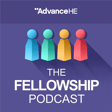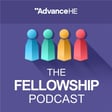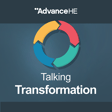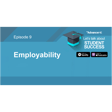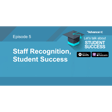Become a Creator today!Start creating today - Share your story with the world!
Start for free
00:00:00
00:00:01

Fellowship to enhance teaching and learning
Episode 1 of Advance HE's new podcast series on Fellowship, a globally recognised marker of teaching excellence. In this episode Louise Lumsden is joined by Raj Dhimar and Marita Grimwood of Advance HE's Fellowship team to discuss the value and impact of applying for and achieving Fellowship for higher education professionals.
Transcript
Introduction to Fellowship Podcast Series
00:00:14
Speaker
Well, Raja Morita, we are here at last, our very first episode of our very first Fellowship podcast series. So exciting. I'm really looking forward to the series, continuing the conversations we already have with each other and sharing our learning with others who are interested and who are possibly um have the same passion or maybe not quite so much about Fellowship as we do.
00:00:42
Speaker
um Just by way of introductions, here today for our first episode um is me. um I'm Louise Lumsden, I'm Head of Fellowships Teaching and Raj. Hello, my name's Raj Deema, Fellowship Awards Advisor at Advanced HE. And we've also got Marita. Hello, I'm Marita Greenwood, I'm Senior Advisor for the Teaching Fellowships here. Thank you Raj and Marita.
00:01:07
Speaker
And if you want to get involved as you're listening, we do have a hashtag and that's hashtag AHE fellowship pod.
Exploring the Importance of Fellowship
00:01:16
Speaker
So the title of our very first episode is a fellowship to enhance teaching and supporting learning. And we thought for this, our first episode, we would just explore um what is fellowship and why it is important. um Just to set the scene and to give you an idea of the current numbers of fellows,
00:01:37
Speaker
So all those who have been awarded a category of fellowship, we currently have just over 198,000 fellows based in over 116 countries. um And to mark all of those fellows, we have a very exciting year planned. And I'll say a little bit more at the end of the episode, but it's looking like we're going to reach 200,000 fellows awarded this year and quite soon.
00:02:06
Speaker
And so it's really important that we celebrate, we mark this major milestone and it's absolutely fantastic. The number ah of those awarded um year on year has just been growing and it's absolutely brilliant. And I'm sure Raja Marita will touch on that um as we go on with the episode. So as I said in the introduction, this first episode is all about fellowship to enhance teaching and supporting learning.
Role of Fellowship and PSF in Teaching Quality
00:02:35
Speaker
But what does this actually mean? what What is fellowship? What does it mean to be a fellow? And Raj, if I can come to you first, because you've been working with the, but with fellowship, the professional standards framework for a number of years. And I just wondered, you know, what it means what it means to be a fellow. ah Thanks Louise. And thanks for kicking things off. Well, it's an absolute pleasure really to talk about fellowship and everything that it encompasses. 13 years feels like such a long time in this space and A huge amount has happened in that time. I remember joining back in 2011 in relation to the 2011 professional standards framework for teaching and learning and higher education. And at that time, there were already 32,000 colleagues that were professionally recognized against ah the PSF as it was then. And fast track, another 13 years, a huge amount has happened across the sector. And I think in that time and preceding that time as well,
00:03:32
Speaker
One of the key aspects or the key drivers really is in relation to teaching quality, um how we consider teaching quality across ah different higher education sectors, how institutions look at teaching quality and importantly how individuals consider ah teaching quality in their own
Evolution and Impact of the PSF
00:03:52
Speaker
context. And it's been an absolute privilege to be able to talk about a professional standards framework for teaching and learning higher education that encapsulates the variety of practice that goes on in this space and ways in which institutions and individuals can use a framework like that to really help consolidate practice, develop practice and importantly gain recognition for teaching and learning because a huge part of what our colleagues do in institutions and wider is do a fantastic job
00:04:28
Speaker
in teaching supporting learning have a dedicated, unrenowned commitment to their learners in whatever capacity that might be, in whatever a subject or discipline might that be. And for a long time, um there was no way in which this type of professional practice could be recognised until the sector-wide development of the PSF was put in place. and We've had now three iterations of the Professional Standards Framework, so 2006, 2011, and most recently, 2023. And in that time, the key aspects of recognition, of practice, of higher education, and finding ways in which we can keep up to date and apace with the ongoing challenges of the world, of society, and where higher education plays a pace.
00:05:20
Speaker
And the PSF has kept up to date with that. And that's been a real important aspect of where I consider ah recognition to be what fellowship is. And, you know, in relation to the PSF itself, it has options for colleagues to work through in terms of career development and career prospects.
Global Recognition and Inclusivity of PSF
00:05:38
Speaker
It enables people to be recognised at all different stages of their career, right from early on.
00:05:44
Speaker
in terms of their education practice, but also then those that are involved at a strategic level across an institution or organization or equivalent. And as part of that as well, what's really exciting to see is how recognition in particular has enabled and unlocked the potential to all sorts of different organizations and institutions globally and to see where a recognition framework that enables different cultural contexts, different varieties of practice and also different institutions wherever they might be in the globe to use a framework and the professional recognition that goes with that to develop staff at different levels and different stages of their career. And then importantly as well to engage in cyclical evaluation and reflection and reviews of where that's going
00:06:44
Speaker
And we're now heading to 200,000 fellows, which I just think is an amazing
Fellowship: Community and Recognition
00:06:50
Speaker
milestone. And I hope that I'll be able to contribute a little bit to that in those 13 years and and long way continue. But for me, fellowship is a huge part ah of that, particularly from the viewpoints that I've just touched on. And yeah, there's a lot more to be said on that, but I'll pause there and ah allow the colleagues to come in. Well, thank you, Raj. Yes.
00:07:11
Speaker
um You have seen a lot of practice over those 13 years and, you know, talking about the framework and we've touched on fellowship and the professional standards framework. And I'm just going to come to Marita now, but perhaps if we've got colleagues who are listening to this and are just finding out about fellowship, we might have to explain those terms um throughout this little first um episode. But Marita, you are nodding as Raju was explaining about what is fellowship you know, what does it mean to be a fellow? And, you know, I'd just like to come to you really for your thoughts. Thanks very much, Louise. It's so interesting to listen to Raj's reflections. He's been engaged with it from winning Advanced Age Chief within the team for ah so for so long. um I think my perspective is a bit different, but it occurs to me, I recognise what Raj is saying, but for a lot of that time,
00:08:08
Speaker
Until two years ago, I was out in the sector working in different universities. And I've really seen what um what fellowships have done, I suppose, and how they have helped to change, to move the culture, I think, to support a shift in culture um in terms of how seriously learning and teaching is taken within within institutions.
00:08:35
Speaker
So I think one of the really important things, some of the sort of the really important things about it are that it's a recognition of work people have done. And I've had people that have somebody say quite recently, oh, this matters to me so much because this is the only thing that there's nothing else that recognizes the kind of work I do. So it's it's very it's very inclusive, it encompasses all kinds of learning and teaching, all kinds of teaching and supporting learning in higher education. And that's really important that it does that and in a way that's globally recognized. And is not you know it's not based on people's roles, it's based on what they are actually contributing to to the students and to the sector. And I think enabling people to become part of the community with a shared sense of professionalism, whichever, whatever your contribution is, however big,
00:09:32
Speaker
or small learning and teaching is as a part of your role and what you do. It ah it shows that it really shows that commitment to particular particular standards of professionalism in in your work in the sector. Exactly, Marita. That was really eloquently put. It does show your you know that you are working as part ah of this global sector and that you are being recognised against those standards that are recognised globally. And we often talk about fellowship as a portable thing, don't we? It's, um you know, because it is recognised, you know, we've got fellows in over 116 countries, for example. So people, you know, can see that actually, um it's something that they can see themselves ah cell themselves applying for. I just, Marita, you touched on about how and people are considering that this is
00:10:30
Speaker
the only thing that people can use to demonstrate and be recognised for their work in teaching and supporting learning. And I wonder if at this point, both Raj and Marita, we should just talk about um the professional standards framework and the inclusive nature of the framework, just so that for anybody who is, you know, listening to us and wondering what fellowship is all about, um you know, we just give a little bit of an explanation as to that.
00:10:56
Speaker
So, Marita, do you want to and continue about the framework and then, um you know, we can perhaps touch on the categories and the characteristics of the categories as well? um Fantastic, yes, yes. So, I mean, the complete, of the complete beginner's guide to the framework, that you know, if you've honestly never, never come across the professional standards framework before, it is effectively assessor statements. statements and we have five areas of activity.
00:11:25
Speaker
five areas of core knowledge and five professional values. And there are four categories of fellowship that which you can make. You can make a claim for each of those categories of fellowship. you have to You have to demonstrate your engagement with the framework about how you are how your work um how your work reflects the framework. And that's different for all of the sort are the four categories, which we'll maybe maybe go into bit a bit later. But i think I think some of the key things about the framework are the fact that it does respect context. So the phrase in your context is threaded through the professional standards framework. It's not about imposing a set of particular practices.
00:12:14
Speaker
um ah particular kinds of learning and teaching it's about saying okay show how what you do in your context is appropriate is that is the right thing to do for your students ah for your institution and so I think that makes it that makes it quite powerful um and it makes it um it makes it possible for many many people to to gain the recognition they need. So for example, you need to short if your um if you you need to demonstrate that you know you you need to demonstrate that you respect individual learners and diverse groups of learners, which is our first professional value, but what that means will look very different in different contexts.
00:13:06
Speaker
And I think that's really exciting. It can make it very difficult to give people easy answers about what a ah good application looks like because they're all different so Exactly. Thank you, Marita. And Raj, just the inclusive nature of the Professional Standards Framework 2023 and your experience of working um with the framework and the categories, you know why now is that really important?
00:13:35
Speaker
Yeah, I think it's a important as as much as it is, as ever it has been, really, and given the pressures that exist now across the sector financially um and in many other ways.
00:13:49
Speaker
Having a framework which enables people to have a belonging, have an identity is really vital ah for our institutions and I would challenge anyone to kind of say you know no institution would would have a strategy that doesn't include a commitment or a goal or an ambition to really strive forward to make teaching and learning as good as it can be for for that organisation.
00:14:12
Speaker
And for individuals involved in that, their commitment in terms of their responsibilities to educate, to research, to teach, et cetera, is part and parcel of that. So, you know, I kind of look at it as a kind of set of standards that has clarity around what it is, and both in terms of categories of fellowship with the four categories that that exist, and then in terms of the dimensions. But actually, it is only as good as the people that use it, as the organizations that use it. And one of the real privileges ah of working with the framework and seeing it used by by different organizations
00:14:54
Speaker
is how they are able to adapt and use the framework particularly ah thinking about the things that Maritz has touched on around context and uniqueness of aspects of practice and particularly you know let's choose the professional values for example where you know that set of values that exists in terms of equity or diversity or equivalence will be variable across different contexts. And so what the framework allows is for institutions and individuals to show that as appropriate to what works for them. um And that's the beauty of it. You know, and it is absolutely something that is for everyone that has a remit to to teach and support learning in her education. And
00:15:43
Speaker
I think as part of that as well, it's giving a sense of value. um And that value is about saying what what I do or what we do collectively matters. What we you do in teaching and learning matters for organisations and for the future of our generations in terms of what they're doing in there.
00:16:01
Speaker
education in their careers and if we're to believe that then for me the PSF is something that really then is worth looking into in in more detail and and spending a little time over in greater depth as well so yes. ah Thank you yes that you know why is it important why is why does it matter and you know it really does matter it you know you both mentioned commitment um during you know our conversation now and It demonstrates that commitment to supporting the high quality student learning. Marita, just a point from you about why it's important and why it matters. um And then perhaps we ought to explain if you are someone who's new, ah talk about, you know, we should point people to the fellowship category tool, for example. But, you know, just a point, a final point from you, Marita, about why it's important. Yeah, I think one of it.
00:17:00
Speaker
One of the really powerful things about it is that it gives people a shared vocabulary for talking about learning and teaching, and for understanding learning and teaching, what effective learning and teaching could look like. you know Universities are really complex organizations. They vary hugely. you know there are lots and Lots of higher education happens in lots of different ways, in lots of different places around the world.
00:17:28
Speaker
And even within an individual university or higher education institution of any kind, you have a number of different disciplines and perspectives, all of which will have particular thats sets of values and approaches and that they you know may disagree, maybe plenty of disagreement there. So I think it really is helpful to have a common reference point to something as important and as essential to what universities do as teaching and learning.
00:17:58
Speaker
it's it's important to have something that people can refer to and to use to use to think with um in different ways. So I think i think that so that for an individual that's becoming part of a community um and for institutions it can be about bringing people together to work on to a conflict of questions problem. Exactly and you know um the professional standards framework is a tool and Raj you touched on about supporting an individual wherever they are in their career?
Four Descriptors of Fellowship
00:18:31
Speaker
Absolutely, absolutely. It can be used um at all stages of of anyone's career and and you know we touched on there being four descriptors that kind of align to four different categories of fellowship and in recognition of that um I remember when
00:18:46
Speaker
the framework when he had two categories of fellowship for example just associate fellow and fellow and it was quite quickly came to light that you know what also was needed was some kind of way of recognizing leadership in teaching and learning how education and hence senior fellowship and principal fellowship were born ah back back in 2011 and the latest consultation reiterated the emphasis of those kind of broad four descriptors of different types of practice being as as relevant as as it can be at this stage But I think, you know, when we think about fellowship, when we think about the PSF and what it's for, you can become, you know, if you like, insular in terms of its language and its context. And there will be colleagues, perhaps listening who who are new. And you might be thinking, what is fellowship? What is PSF? And, you know, there are ways in which colleagues can can look at information or detail as our website, for example, and so on. But actually, just to test out, you know, if you are engaging in teaching and learning how education and social support for
00:19:45
Speaker
There is a tool called the fellowship category tool that enables colleagues to self-assess essentially against their practice. And that will determine an indicator as to which category of fellowship might be most appropriate from the four categories and a potential application could be made on that basis from there. um And yeah, just kind of using it in ways, not only then to develop practice to gain recognition, but as an ongoing source of support um and identification of ongoing CPD, Continuing Professional Development, you know, and that's really based on the emphasis that if we're to believe or consider that good teaching and learning is something that requires work, requires PAP's effort and redevelopment, and we can kind of think about major incidents in the world. Recently the pandemic, for example, the other aspects of of change that really shines a light on how
00:20:42
Speaker
we continue to move, evolve and move forward in our education. And that includes the practices that go on within any subject or discipline or professional services. And I think the other thing around the inclusivity angle that I just want to mention is that this framework um perhaps may be mistakenly considered or perhaps designed ah for those that were in inverted commas, academic roles or responsibilities. um I would like to you know rehearse or share a message that it's really important that this is something for everyone that's involved in teaching and learning. And colleagues that are involved, for example, as career staff or librarians or technicians, for example, that do an absolutely critical role are also able to belong as part of this framework can identify within this framework as well.
PSF 2023: Inclusivity in Higher Education
00:21:34
Speaker
And I think we're seeing some increasing interest
00:21:37
Speaker
from parts of the world there, but do find out more and you know look at what's available and should anything you know further a arise in terms of queries, we'd be happy to help. Thank you, Raj. And I think that's a really important message. It's about the inclusive nature of the professional standards framework. And that was it its intention following the consultation and the revisions and the PSF 2023 bills on the strength of the previous framework. And it has and then evolved to support a wide variety of individuals um to use the framework and be recognised for their practice.
Conclusion and Future Topics
00:22:16
Speaker
So I think that's probably a really good place for us to end our very first episode um of our Fellowship podcast series. I'd really like to thank Raj and Marita for helping to set the scene for the series by explaining what Fellowship is, why it matters to those who have been awarded
00:22:36
Speaker
um And, you know, I think you've heard strongly there's a strong sense of commitment and that demonstration of commitment in order to be recognized. um To anybody who is just in the process of crafting or developing an application, please do continue to use the guidance. Make sure you've undertaken the fellowship category tool, which is free to use and will start you off on your journey and give you an indicator of which category of fellowship um is the most appropriate for you.
00:23:05
Speaker
Our next episode, Episode 2, is going to focus on one of the categories um and this is going to be Senior Fellowship. So this is Descriptor 3 of the Professional Standards Framework. We'll be looking at the key characteristics of the category and possibly, no doubt, we're here with the experts. and We will be probably offering some top tips. So please do listen ah whether you are a Senior Fellow already.
00:23:33
Speaker
whether you are supporting colleagues in your institution to apply for senior fellow or if you're interested in applying for senior fellowship yourself. um And just one final point, um I mentioned in the beginning about this fantastic milestone that's coming up. We're celebrating 200,000 fellows this year and to mark this absolutely terrific milestone and to so celebrate with us um We're running a year-long campaign called Festival of Fellowship. So please do get involved and that's on the hashtag festival of fellowship. ah Well, thank you very much, Raj. Thank you, Marita. And we'll look forward to seeing you next time. Thank you. Bye. Bye.
